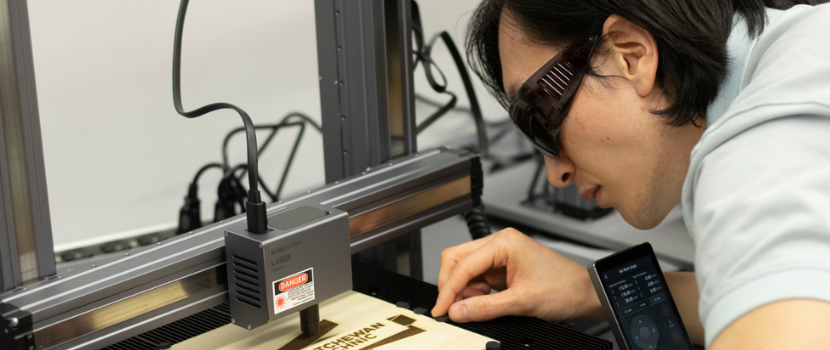
Are you passionate about computers and technology? Do you have an interest in how smart devices and the Internet work? Are you finding yourself reviewing the newest and latest technology? If so, Saskatchewan Polytechnic's Computer Automated Systems Technician diploma program at Regina Campus will immerse you in the latest computer and automated technologies.
Start date
September
Length
64 weeks
Location(s)
ReginaMore than ever, advances in computer technologies are making our world a smaller place. The computer industry continues to provide us with faster and more robust networks and devices that keep us all connected. This growth is ensuring that there is a strong demand for the technicians that can design, build, maintain, and repair the computer automation systems that produce global innovations.
Hands-on labs and courses that focus on the computers, automated systems, and using industry-standard software and equipment, will give you the confidence to be successful in the fast-paced and evolving computer automated industry.
You will build a solid foundation in:
- computer hardware
- customer service
- Windows operating systems
- Linux operating systems
- simulation and prototyping software
- 3d modeling
- 3d printing
- data collection
- problem solving
- project management
- python programming
- Application Programming Interface (API) integration
- computer networks
- device and network security
- wireless technologies
- electronic communication technologies
The program's delivery methods focus on the technology of today and provide you with a hands-on approach to learning.
Assignments may require a considerable amount of time outside of regular class hours.
You learn by doing
Ready to work
Career and salary information
Your career
The computer automated systems technician industry consists of analytical teams and individuals using their logic, problem-solving and technical skills to develop and troubleshoot communications, automation, and computer systems for their employers. Graduates can work as part of a team or on an individual basis. Graduates must be able to handle the pressures of troubleshooting, installing, and configuring all types of computer and communication systems.
Graduates are found working in a variety of industry sectors such as internet service provision, wireless communications, information technology, and computer systems.
Look for employment in IT, technical support, on-site service technician, wireless systems, automation installation, custom automation solutions, home security, network support, and computer repair. For more information, contact Student Employment Services at a campus nearest you.
Potential careers
| Sample job title | NOC classification |
|---|---|
| Help desk technician | User support technician (22221) |
| Computer repair technician | Electronic service technicians - household & business equipment (22311) |
| Computer numeric control (CNC) programmer | Industrial engineering & manufacturing technologists & technicians (22302) |
Admissions
Admission requirements
- Grade 12 with Workplace and Apprenticeship Math 30 or Foundations of Math 20 or Pre-Calculus 20, or
- Computer Automated Systems Technician (CAST) certificate, or
- Telecommunications Networking Technician (TNT) certificate
- English Language Requirement
Alternative admission
Applicants who do not possess the academic qualifications for a program may be admitted if evidence of probable success can be established through an alternative admission assessment. Applicants are automatically considered for alternative admission. However, some specific admission requirements may still need to be met.
ACCUPLACER©
Refer to the ACCUPLACER© cut scores for this program below, and review additional details concerning Alternative Admission using Accuplacer.
- 250 Arithmetic
- 247 Quantitative Reasoning, Algebra, and Statistics
- 250 Reading
- 245 Writing
Post-secondary
Some programs allow applicants to meet the admission grade level requirement using 15 approved post-secondary credits. Review additional information.
Admission method
First Qualified/First Admitted
The First Qualified/First Admitted (FQFA) process is used for the majority of Saskatchewan Polytechnic programs. When we determine that you meet the program's admission requirements, you will be offered admission based on the date you fully qualify for the program. The earlier you provide the appropriate documents and information that qualify you for admission to the next intake, the earlier you might begin your studies.
Applications for all FQFA programs open September 1 each year.
Sponsored programs or programs targeted to specific groups do not accept applications year round or maintain an application pool.
See Admission Processes for more information about this method of admission.
Tuition and fees
Estimates are based on current rates and are subject to change. Amounts for a program may vary by campus. Totals shown here include all mandatory fees as well as approximate cost for books and supplies. Visit the Tuition and Fees web page for a complete breakdown of tuition and fees for this program.
2025-26 academic year
Year 1 - $6,960
Year 2 - $6,600
Courses
Get credit for what you know
Prior Learning Assessment and Recognition
Saskatchewan Polytechnic recognizes that adults learn in many different ways. This includes acquiring knowledge and skills through life and work experience or non-formal training.
See link(s) below to get more information about PLAR.
Transfer credit
Many Sask Polytech students benefit from transferring course credit. You may be eligible to transfer credit to Sask Polytech or to another college or university.
Accreditation
Technology Accreditation Canada (TAC) accredits the program at the Technician level.
TAC is a bold, world class accreditation organization, delivering accreditation services for the engineering technology and applied science profession in Canada.
Professional Registration
Technology Professionals Saskatchewan
Technology Professionals Saskatchewan is the provincial regulatory body for graduates of this Saskatchewan Polytechnic program. As a graduate of an accredited program recognized by Technology Professionals Saskatchewan, your academic training places you on an expedited path towards obtaining professional registration as a Certified Technician (C.Tech.). For more information, visit tpsk.ca
Related programs
Computer Engineering Technology
Computer Networking Technician

